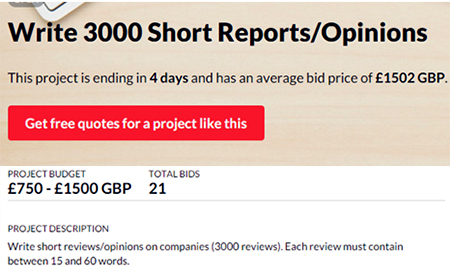My Job Churning Out The Garbage Behind Clickbait Titles

Thanks to the internet, there are more ways than ever to find success with your art -- drawing My Little Pony porn, sculpting Pokemon porn, writing Furby porn ... the list is infinite. Oh, but success doesn't always translate to money, and very few landlords accept "exposure." That's why many young writers are turning to the dreaded content mills to feed themselves. We spoke to Jen, a former such writer, and she told us ...
A Huge Chunk Of The Internet is Created By A Small Group Of Desperate Writers

When you're up late, idly googling different dog breeds and what that pain in your side might be (spoiler: it's cancer), you might notice a lot of the same sites popping up. These articles are usually unsourced and read like they were written by somebody three weeks into their English Duolingo. Those are content mills. They're central databases of jobs for writers, and typically low-effort and low-paying, which is why they're not of the highest quality. Paying as little as a few bucks per article, most writers have to churn out several an hour to make any kind of decent wage. Ta-Nehisi Coates won't even fart into a microphone for that kind of money. (We've asked. We assume that's why he has us blocked on Twitter.)

"I won't even do mouth fart noises for less than four figures."
When Jen was young and hungry (as opposed to more seasoned writers, who are old and hungry), this is where she got her start. "The basic format of a content mill is you sign up and provide a writing sample. This sample provides you with a numerical rating, which in turn determines what assignments you get access to. Depending on how well your articles are rated by clients and the editorial staff, you can move up in rank. Clients place orders on a job board, and they can be grabbed in a first-come, first-serve basis by a willing author."

"Willing" being a polite way of saying "impoverished."
There's a reason they're at the top of the Google page: "Most of the assignments are for SEO content, which basically means 'Write some bullshit based around a few keywords squeezed into the text X number of times.'"
That's why the resulting content tends to read the same. It's all coming from the same relatively small pool of desperate writers trying to out-bullshit each other. Which is different from regular writing ... for ... some reason?
There's A Reason Garbage Content Goes Viral

You might wanna sit down for this one: Not everything you read on the internet is true. But somebody still has to write those erroneous articles, and it all starts with one assignment. "What do you do when someone tells you to write a lengthy medical advice guide?"

Guess again.
Perform hours of painstaking research? Ideally, maybe, but this assignment is paying $3. You need to get it done as fast as possible so you can move on to kosher life hacks.
Instead, "You hop on WebMD, find a way to reword all of their information, and pray that it wasn't written by someone just as clueless as you are."
"The worst is when you're given a task to cover breaking news by a blogger who wants to catch a story when it's first trending," Jen goes on. "Presumably, real journalists have things like sources and travel budgets. I most assuredly did not. What I had was Google and a tight deadline. So you do your best to cobble together an article based on what's already been written without making it look more plagiarized than a freshman English paper. While you're doing this, you discover that all of the news articles you're finding on the topic sound ... eerily familiar. Covering the same sets of facts. Citing the same quotes. And realize that you are not, in fact, the only person ripping off every other news site."

"Dr. Dre's Instagram is basically the same thing as a medical journal, right?"
"You might notice that all of these are basically exactly the same thing. That's because all of those stories got their information from the same press release, which was distributed by this company here."
And where do those press releases come from?
"I've written a whole bunch of those too," Jen says. "A lot of these press releases are just promotional pieces for businesses, authors, celebrities, etc. that get distributed through sites like PR Web, and people hungry to put something, anything 'fresh, new, and relevant' on their blog will totally troll these sites, reword a press release (or just copy it verbatim), and bam, instant news. So if there's a piece of misinformation in that initial press release ..."

Occasionally you get the fall of European communism, but usually it's people confused about whether eggs are healthy.
Which is entirely possible, remember, because they're usually written more hastily than a fake phone number at last call ...
"... there are now god-knows-how-many websites spreading that exact same lie. And the more times it gets copied, the more legitimate it looks."
This desperate daisy chain of BS is so rampant that there is an entire industry devoted to teaching people how to spot fake news, which includes us. Thanks for the ramen money, content mills!
Just Because It Says An Expert Wrote It Doesn't Mean An Expert Wrote It

Remember when Jen mentioned earlier that she hoped the person she was ripping off on WebMD knew what they were talking about? Why would she say such a thing about the bastion of integrity that is WebMD? Because she knows firsthand that a lot of the authors in question aren't real MDs. Shocked and aghast, you are!
"There are a lot of experts in their fields who want to boost their incomes with things like books, websites, blogs, speeches, promotional videos, etc." Jen says. "Thing is, since they're experts in, say, being doctors or running businesses, most of them aren't really talented wordsmiths, so they rely on ghostwriters. And if you're strapped for cash, the cheapest way to get a ghostwriter is to troll the content mills."
So you end up seeing a lot of ads that look like this:


Apparently, "Thou shalt not bullshit thy authorship" didn't make the final commandment cut.
Sometimes, Jen's clients provided her with all the info she needed: "They would send me a detailed outline or paragraphs of rambling, and I'd turn it into coherent, engaging copy." Other times, though, "people get lazy or just don't have the time to put in all that effort, and so instead they give you a general idea of what they do and say, 'Good luck!' So here, an underpaid writer with no experience whatsoever in the field would be given an assignment due within a couple of days to write authoritatively and persuasively about something they've never studied. Which mostly comes down to a lot of frenzied Google searches held together with bullshit."
The worst, Jen says, "was when I got contracted to write a whole bunch of medical advice for a site that was supposed to fill the same niche as WebMD. I wrote all the content, and they slapped a doctor's name on it. I have no idea if those names were even real people ... I abandoned the project a few pages in once I realized that literally no one was fact-checking anything I was writing."

For those wondering what site this was, the answer is "It doesn't matter. Don't take medical advice from the internet."
Sometimes, the very concept of "fact" gets dragged out to the street and curb-stomped into a quivering puddle. "I had one client who was a doctor, and his side business was selling a whole slew of nutritional supplements that would supposedly slow down the aging process, boost your immune system, reverse hair loss, etc." Jen says. "All he gave me to go on was the supposed benefit of the product and its active ingredient. I had to come up with all of the science-y explanations for how and why this thing was so awesome and effective, talking about how 'I' had developed it through years of 'my' research, so it could be published with his name on it."

"This test subject saw increased immunity, more hair, and maintained a youthful appearance within one year of using this product."
When that copy ends up on obviously quackish snake-oil ads, there's little harm done, but "some of these things were ending up on high-profile sites," Jen says. "You know how sites like Huffington Post and Forbes have regular columnists? I wrote blogs for some of those people. Sometimes they'd just give me a general topic or a post title and tell me to come up with something for it, with no further guidance. 'But this is an opinion piece,' I'd say. 'What's your opinion on this?' 'Whatever you think, I trust you.'"
Wow. If you'll excuse us, we've spotted a prime opportunity to fill an unsuspecting Huffington Post editor's inbox with incoherent rants about the connection between Mr. Belvedere and white genocide!
Even The Comments Are Probably Paid For

You're not going to fall for this internet misinformation circle jerk. You want real talk, so you strap on your Comments Codpiece and scroll straight to the bottom of the article. Guess what? Those people might not be legit either.
"There are services that will pay people to post on your blog or forum, very much like paying kids to come to your birthday party and pretend to be your friend," Jen says. "The one I used was called Postloop. I loved them because they paid reliably and you could cash out immediately instead of once a week. So if you were desperate to make a little extra to cover a bill or something, they were easy. The way works is you sign up and choose some topics you might be interested in. They match you with forums, which you must post in, meeting a certain frequency and post length requirement so you don't look too spammy. Assuming you fit within their guidelines, you make a meager amount of money from the chatting."

No, that payment figure wasn't accidentally reversed.
There's no "homophobic slur" quota, though. So sadly, those ones are probably real.
You probably already know about the practice of paying for fake reviews, which comprised up to one third of all reviews before they finally cracked down on it.
"Although it's less common now due to being incredibly illegal," Jen says, "you'll always find someone, somewhere, willing to do it."
In fact, Jen's very first assignment was to write a positive review for a sleazy diet pill company, and ads like this still grace the internet as we type:

At least with this, you're making more than 200 bucks for the length of a modest novel.
There are all kinds of sneaky ways you can plant false advertisement online. "One client I wrote for was in the business of 'online reputation management,'" Jen says. "Basically, the idea is to create a ton of sites that say good things about you / your brand in order to drown out the negative things that someone could otherwise find by Googling you. This service is usually used for things like people who unfortunately share a name with a convicted felon. But it's also really handy for hiding negative reviews that could have been written by someone working for a competitor."
That's right -- you could end up the good guy in the fake review business, fighting fake with fake. It's liars all the way down.
There's A Formula To Writing Internet Scams

Naturally, there's a lot of competition for these assignments, and you don't make the absurdly small bucks without getting your craft down to a science. You need a thorough understanding of how to get your client the most money. According to Jen, "There are three ways a piece of written content makes money: Someone is buying it directly, it's generating a lot of clicks and thus ad revenue, or it's helping them sell their own product. There's not a lot of money in that first category, so we mostly get hired to do the other two."

"We need you to rewrite our entire vitamin website so it doesn't raise any scam alarms. Here's $3.50 and a Burger King coupon."
Of course there's a mathematically precise strategy for both:
"The easiest way to get a lot of clicks on something and try to make it go viral is to spark outrage and incite hate-sharing. Y'know, doing things like nerd-baiting, or feminist-baiting, or conservative-baiting." Well that seems easy enough. Simply stroll into the internet, shout, "Deadpool sucks!" and let the money roll in? Alas, no. There are several key components to a successful hate-share.

Specifically, the words "Obama," "vaccinations," and "Ghostbusters remake."
"The trick is to figure out what buzzwords and stances will piss someone off, and exploit that to create a story that will feed into the fears and self-serving ideology of whatever group you're targeting," Jen says. "You make bold claims, because a moderate stance won't inspire anyone."
It works best if you outright lie: "You learn to write headlines like 'Is ISIS Secretly Running the White House?' because even of the bulk of your article is 'No, obviously not,' you know readers will glide right over that question mark and remember the headline. You've planted that seed."
As for the other tactic: "If you're trying to sell a product, what you do is tap into the fears and insecurities of your audience. There's a very specific type of page called a 'squeeze page,' which basically exists solely to get someone to sign up for your newsletter. Squeeze pages are written in a very, very specific manner. You start by identifying a problem that someone might have -- let's say a dirty kitchen. Then you make that problem sound really, really awful. You talk about all of the microorganisms living in that kitchen, and the number of pathogens your kids end up ingesting every single day from eating off your counter tops, discrediting all of the methods they might already be using to solve that problem."

"Congratulations, you've murdered your family."
"You make a personal connection with them, to empathize and make them feel better. They're not stupid. They're not bad housekeepers. You were once exactly where they were. In fact, you were worse off. You were sick and miserable all of the time. Your kids had autism and leukemia and progeria all at once, and you had no idea that it was all due to these war germs lurking in your silverware drawer. you discovered a simple solution, and it's so important that you're going to share that solution with them, absolutely free. Then you talk about that solution in the vaguest way possible, using a lot of power words like 'innovative' and 'powerful" and 'results' and 'simple.' 'With one easy step,' 'best-kept secret,' etc."

Turns out the one weird trick is signing up for a questionable newsletter.
Finally, you tell them that "all they have to do in order to solve this debilitating, horrible problem that is destroying their life (even if they just learned about it five minutes ago) is put in their email address and receive your FREE report (or video, or e-book, or podcast, or whatever). Except that free report probably doesn't actually do shit to solve their problem, if the problem was real to begin with. Instead, it just lays a trail of breadcrumbs to get them to do the next step, and the next step, until eventually they end up forking over a whole lot of money for some service of yours. Meanwhile, even if they turn down that service, the site owner now has their email address, which they will use to send them promotional materials -- all of them written with clickbaity titles and promises of wonderful things if they just fork over a little bit of cash. Less than the cost of a cup of coffee! (If you buy the most expensive cup of coffee every single day for two years.)"
If all of this sounds incredibly evil, well, it is. But what can you possibly do to protect yourself from it? Luckily, we have a powerful and innovative -- yet simple - solution that guarantees results with one easy step. It's our best-kept secret, and all you have to do is sign up for ...
Have a story to share with Cracked? Email us here.
For more insider perspectives, check out 3 Books From Dinosaur Erotica's Most Prolific Author and 5 Secrets I Know About Women (From Writing Their Weird Porn).
Subscribe to our YouTube channel, and check out Why Being A Writer For 'Game Of Thrones' Must Suck, and other videos you won't see on the site!
Also, follow us on Facebook, and we'll follow you everywhere.
